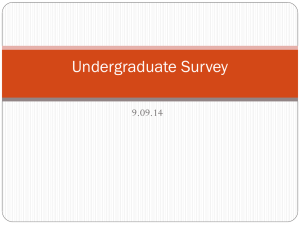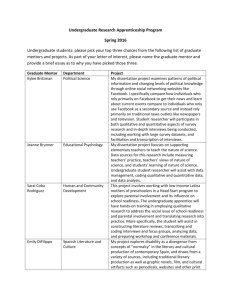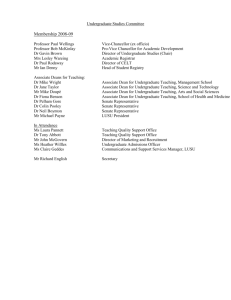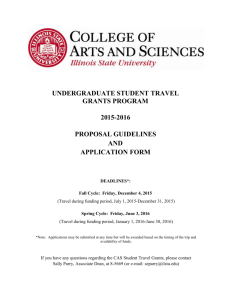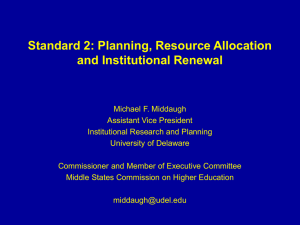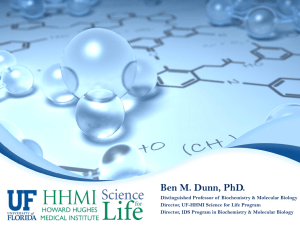Teaching Philosophy
advertisement
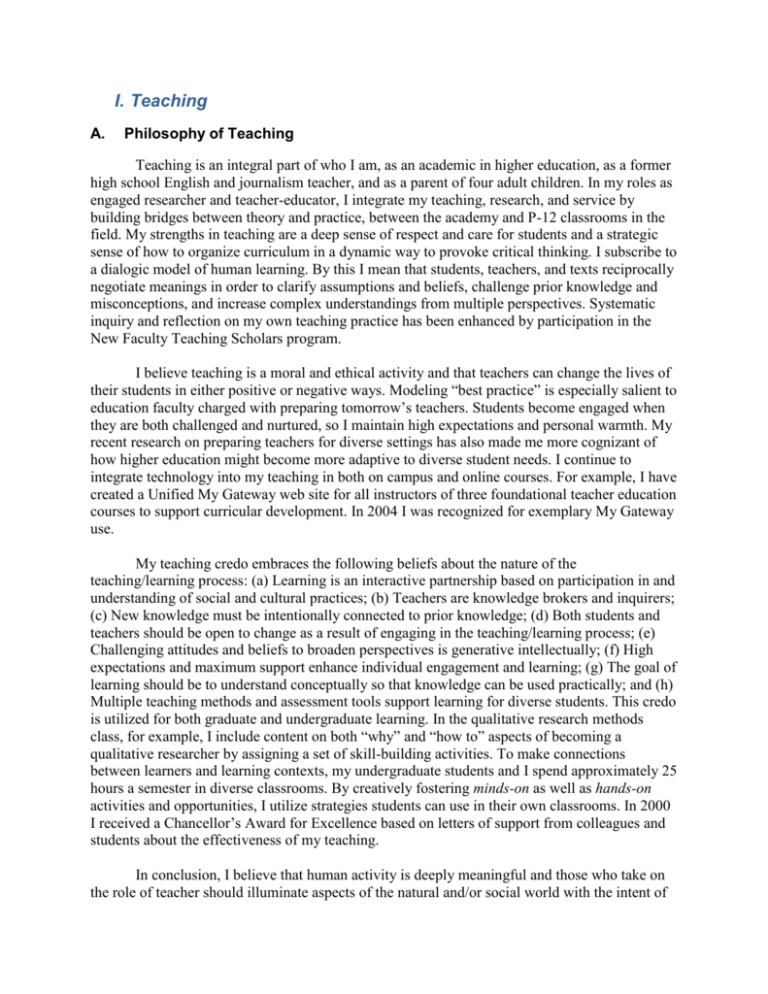
I. Teaching A. Philosophy of Teaching Teaching is an integral part of who I am, as an academic in higher education, as a former high school English and journalism teacher, and as a parent of four adult children. In my roles as engaged researcher and teacher-educator, I integrate my teaching, research, and service by building bridges between theory and practice, between the academy and P-12 classrooms in the field. My strengths in teaching are a deep sense of respect and care for students and a strategic sense of how to organize curriculum in a dynamic way to provoke critical thinking. I subscribe to a dialogic model of human learning. By this I mean that students, teachers, and texts reciprocally negotiate meanings in order to clarify assumptions and beliefs, challenge prior knowledge and misconceptions, and increase complex understandings from multiple perspectives. Systematic inquiry and reflection on my own teaching practice has been enhanced by participation in the New Faculty Teaching Scholars program. I believe teaching is a moral and ethical activity and that teachers can change the lives of their students in either positive or negative ways. Modeling “best practice” is especially salient to education faculty charged with preparing tomorrow’s teachers. Students become engaged when they are both challenged and nurtured, so I maintain high expectations and personal warmth. My recent research on preparing teachers for diverse settings has also made me more cognizant of how higher education might become more adaptive to diverse student needs. I continue to integrate technology into my teaching in both on campus and online courses. For example, I have created a Unified My Gateway web site for all instructors of three foundational teacher education courses to support curricular development. In 2004 I was recognized for exemplary My Gateway use. My teaching credo embraces the following beliefs about the nature of the teaching/learning process: (a) Learning is an interactive partnership based on participation in and understanding of social and cultural practices; (b) Teachers are knowledge brokers and inquirers; (c) New knowledge must be intentionally connected to prior knowledge; (d) Both students and teachers should be open to change as a result of engaging in the teaching/learning process; (e) Challenging attitudes and beliefs to broaden perspectives is generative intellectually; (f) High expectations and maximum support enhance individual engagement and learning; (g) The goal of learning should be to understand conceptually so that knowledge can be used practically; and (h) Multiple teaching methods and assessment tools support learning for diverse students. This credo is utilized for both graduate and undergraduate learning. In the qualitative research methods class, for example, I include content on both “why” and “how to” aspects of becoming a qualitative researcher by assigning a set of skill-building activities. To make connections between learners and learning contexts, my undergraduate students and I spend approximately 25 hours a semester in diverse classrooms. By creatively fostering minds-on as well as hands-on activities and opportunities, I utilize strategies students can use in their own classrooms. In 2000 I received a Chancellor’s Award for Excellence based on letters of support from colleagues and students about the effectiveness of my teaching. In conclusion, I believe that human activity is deeply meaningful and those who take on the role of teacher should illuminate aspects of the natural and/or social world with the intent of improving the human condition through systematic inquiry and problem-solving activity. I believe that epistemological challenges in an information age will transform the ways we teach and learn in the future. Funding sources increasingly demand collaboration with local, regional, and global partners, using interdisciplinary strategies to research complex issues. My goal is to inspire lifelong learners who become advocates for their students and responsible citizens of their communities. B. Goals and Accomplishments My teaching and advising span the divisions of Teaching & Learning and Educational Psychology, Research, and Evaluation. I have taught undergraduate and graduate courses, traditional, online, and field-based courses, as well as Honors College courses, cross-listed with the Institute for Women and Gender Studies (IWGS). The focus of my teaching responsibilities is two-fold: the preparation of future researchers in the field of education, and the design and delivery of a field-based undergraduate teacher education program, specifically a foundations course on child and adolescent development. In recent years I have taught courses in Research methods and Social and Personality Psychology in Wuhan, China, at Central China Normal University and an Introduction to Educational Psychology at Korea University in Seoul, Korea. I am committed to expanding opportunities for future teachers to have experiences abroad and to bring what I have learned from working with international students to improve teaching/learning processes. At the doctoral level, I have developed two seminars, Sociocultural Perspectives in Education and Qualitative Research Methods I. In the research course students teach a concept (such as hermeneutics, post-structuralism, or validity) to peers from a “Word of the Day” list. They also hone their observational skills by using thick description to capture a setting both literally and interpretively. I serve on over 20 doctoral student committees, often as the qualitative methodologist. Through one-on-one dialogue, I help students identify viable topics and methods for dissertation work. At the undergraduate level, I am lead instructor for Introduction to Learners and Learning, and have integrated content about teaching diverse students, character education, and the use of technology into the course. Student groups create web pages about a developmental age or issue, and despite varying technology skills, students learn to critically identify Internet sites as tools for teaching/learning. As Level I Leader, I coordinate multiple sections of three foundation courses in the teacher education program, assisting with scheduling sections, orienting new teachers to the curriculum, creating and maintaining an instructor site on My Gateway, and helping coordinate the field placement at partner schools. Additionally, I represent the COE at the Professional Development School Collaborative (PDSC), an umbrella organization of school/university partnerships. Because of our innovative work to redesign the undergraduate teacher preparation program, a group of COE colleagues and I received Faculty Performance Shares from the UM-System in 2001. Finally, I have developed two courses, Gendered Learning and Gender, Language, and Identity. The second course is part of an IWGS certificate strand that I helped design in 2004 with colleagues from Arts & Sciences. I continue to work on keeping course content up-to-date and finding more active ways to engage student learning.





